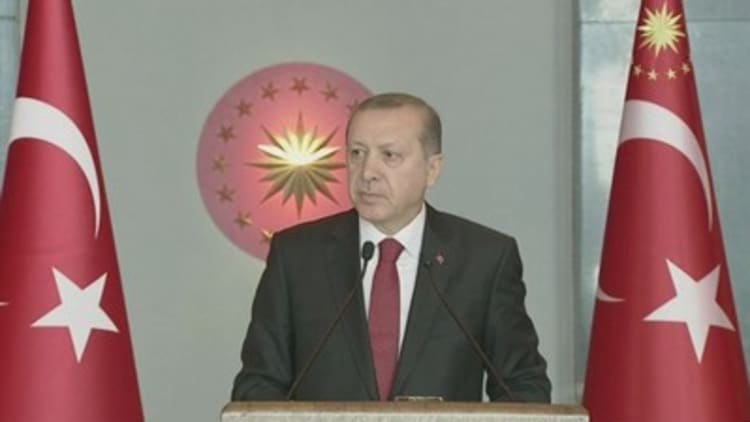
Millions of Turks might be celebrating the failure of an attempted coup but experts are warning that the thousands of arrests of alleged government opponents could herald a more "radical and authoritarian" regime.
President Recep Tayyip Erdogan has quickly rounded on his political rivals following Friday's failed coup attempt with nearly 20,000 members of the police, civil service, judiciary and army detained or suspended from duty, Reuters reported.
Crowds of pro-government supporters have called for the reinstatement of the death penalty to deal with the "plotters" and Erdogan said that "those who launch a coup will have to pay the price for it." He has accused political opponent Fethullah Gulen who is in self-imposed exile in the U.S. of being behind the plot, and has demanded his extradition.
Purge only 'just starting'
The large number of people accused of being part of the plot to overthrow Erdogan has prompted international concern with world leaders warning Turkey to respect the "rule of law" and to not to use the coup as an excuse to get rid of any political opposition.
However the coup attempt highlighted popular support for the leader and for Turkey's democracy among a people who are fed up with political instability - there have been four coups of varying degrees since 1960.
On Friday, more than 200 people were killed as factions of the military tried to seize power in Turkish capital Ankara and major city Istanbul but the plot failed largely because of a lack of public support, organization and international backing.
Erdogan has called on Turks to show support for democracy - and, by default, his leadership and his AKP party - by taking to the streets to celebrate the coup's failure. Even though thousands have done so, bringing a carnival atmosphere to Turkish cities, analysts warn that the party could soon be over and Erdogan's regime could become increasingly authoritarian from now on.
Attila Yesilada, partner at analysis firm GlobalSource Partners in Istanbul, told CNBC on Tuesday that more arrests were likely and that these could exacerbate simmering tensions in Turkey between pro-Erdogan religious conservatives and secularists who fear that Turkey is drifting away from its founding, secular principles.
"This is just starting. In addition to the army, more than 8,000 people in the interior ministry have been sent to passive duty and are being detained as we speak," he said.
"More than 1,500 people in the ministry of finance, two members of the constitutional court and 200 members of other high courts- it is really unfeasible to imagine that evidence has been gathered about their contribution to the coup in such a short time so there is some amount of extra-judicial activity going on here, this is reminding me of a witch hunt and the justice ministry is promising the people that more with come," Yesilada said.
"I am afraid that this opportunity will be grasped by hard-liners in the AKP to eliminate the Kemalists (supporters of the secular principles implemented by 20th century Turkish leader Mustafa Kemal Ataturk) secularists and anybody they consider as enemies which would simply further increase rifts in society and have a chilling impact on the business climate."
'The West needs Turkey'
Despite global concerns over Erdogan's response and general misgivings about his increasingly autocratic regime, western leaders rely on Turkey as an ally in the fight against militant group Islamic State in Syria and Iraq and are not keen to isolate or condemn his response too strongly.
Nevertheless, it has been warned it could be suspended from military alliance NATO if the purge intensifies and European leaders said on Monday that its hopes of joining the EU will end if it reinstates the death penalty.
Tina Fordham, chief global political analyst at Citi, told CNBC on Tuesday that Erdogan's response could have an impact on Turkish-Western relations and the country's deal with the EU to stem the flow of refugees fleeing Syria and heading to Europe.
However, there was a limit to how much the West could do, she said.
"The rounding up of 10,000 people is a worrying sign as it the potential to go back on the refugee agreement but the West needs Turkey and NATO needs Turkey so at the moment we've heard the usual language about being cautious about overreacting to these events," she said.



